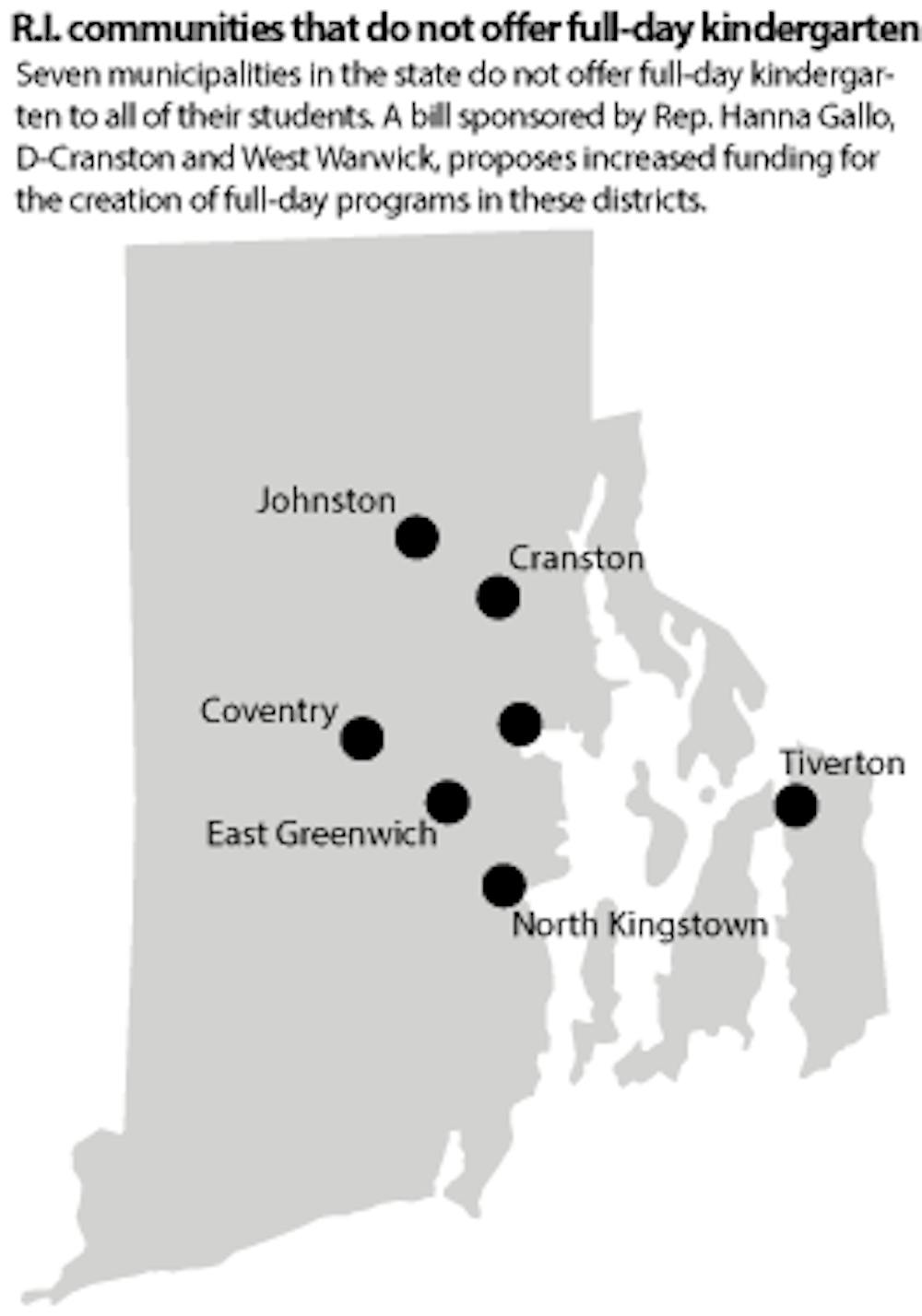A bill introduced in the General Assembly last month would increase funding for new full-day kindergarten programs beginning next fall.
Seven Rhode Island communities — Cranston, Johnston, Warwick, Coventry, East Greenwich, North Kingstown and Tiverton — do not offer full-day kindergarten programs to all students. Four of those districts — Cranston, Johnston, Coventry and Tiverton — offer none of their students full-day kindergarten.
Under current law, full-day kindergarten programs that will start in the 2015-2016 school year will receive baseline funds, which differ by district, during their first year. The amount will gradually increase over a three-year period to a maximum. The new legislation, sponsored by Sen. Hanna Gallo, D-Cranston and West Warwick, would accelerate funding to these kindergarten programs so that they receive the maximum during the first year.
About 1,100 students would be affected by the bill if it passed, the Providence Journal reported.
Current funds come from the state’s education aid, said Sen. Joshua Miller, D-Cranston and Warwick. “If the bill passes, the existing funds would be distributed across all of Rhode Island’s 39 cities and towns, rather than just the subset of them that have full-day kindergarten programs,” Miller said. “This would provide for a more fair distribution of the money,” he added. The program would cost about $3 million in its first year of implementation and would wane in cost gradually, Miller said.
Gallo’s proposed bill is introduced during a time when more young children are enrolling in preschool programs and full-day kindergarten. An estimated 75 percent of four-year-olds in the U.S. are enrolled in some type of preschool program, according to the 2013 Rhode Island Kids Count Factbook. In Rhode Island, 68 percent of kindergarteners were enrolled in full-day programs during the 2012-2013 school year, an increase from 18 percent in 1999-2000.
But the state’s current fraction of kindergartners enrolled in full-day programs is lower than the national average of 77 percent.
“Early childhood education is much more in the discussion than it was so 10 years ago,” said John Tyler, professor of education, economics and public policy and associate dean of academic affairs at the Graduate School. The increased emphasis on early childhood education may be largely due to a heightened awareness of its benefits. Tyler cited the findings of brain scientists and the work of Nobel Prize laureate Jim Heckman as central to illuminating the cognitive, social and economic benefits of early childhood learning.
“Investment in K-12 enhances quality of life — we will have consumers who are able to appreciate diversity of culture and art, and at the same time the outlook for the state will be improved,” said Kenneth Wong, professor of education and chair of the department.
Tyler stressed two overarching explanations for the importance of early childhood education. “One is that we are having an educational impact at a point where a child’s brain is very pliable and able to learn things,” he said. “Second, there is a longer time horizon to reap the benefits from these educational investments.”
In spite of the overwhelming evidence demonstrating the benefits of early childhood education, it is important to approach policy proposals critically and ask the “hard-nosed questions,” he said.
Tyler questioned whether high-quality learning would take place, noting the need to focus on who would be affected if the bill passed. “We wouldn’t want to think we are providing high-quality education but instead provide expensive day-care,” he said, adding that he’d “rather spend money on a high-quality math after-school program than a low-quality kindergarten program.”
Wong also emphasized the importance of eligibility criteria in ensuring the support of underrepresented and low-income groups.
“There are standards in place that address learning quality. In particular, there is a curriculum requirement,” Miller said.
To minimize costs in the state education budget, Wong proposed some options that could cut expenses. “Rhode Island is not a large state in terms of student enrollment. Some of the services could be incorporated across the system so that it could be more efficient,” he said, adding that charter schools should get more involved in early childhood education. “They already have a school community. It is only logical for them to include the early childhood piece.”
“We are very optimistic this year, because people are talking about it not only in an education dialogue but also in a workforce development context, which hasn’t been the case in the past,” Miller said. People are excited by the bill’s potential to create new jobs in the districts affected by the policy, he added.





